| Article Index |
|---|
| Start |
| Previous editions |
| Sponsors |
| Honorary Patrons |
| Case studies |
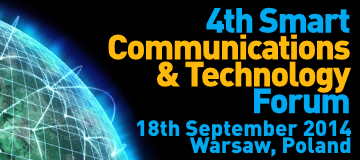
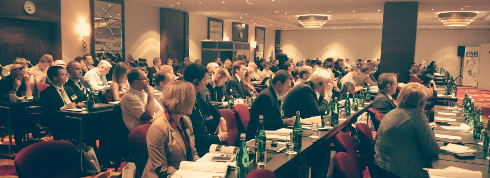
John Webster, Opower - Polish energy consumer must understand the value of smart meter functionality. "Smart meters means new tools"
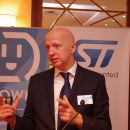 "Implementation of smart metering projects in Europe and in Poland is a big challenge, and Opower wants its share. The smart meter project constitutes nearly 170 million households across the European continent. The crucial implementation feature is building consumer awareness of the smart meter potential. Consumers must first understand the benefits of adopting the smart meter and thereby accept the necessary financial investment. The aim of education is not mere customer acceptance of house meter, but an understanding of the 'value' resulting from 'the intelligent functionality" - explains John Webster, Vice President of the company Opower (UK), which works with public utility companies throughout the world. Mr. Webster shared his experiences and presented the possibility of a new quality of service for Polish consumers of energy during the 4th Smart Communications & Technology Forum, which was held on 18 September 2014 in Warsaw.
"Implementation of smart metering projects in Europe and in Poland is a big challenge, and Opower wants its share. The smart meter project constitutes nearly 170 million households across the European continent. The crucial implementation feature is building consumer awareness of the smart meter potential. Consumers must first understand the benefits of adopting the smart meter and thereby accept the necessary financial investment. The aim of education is not mere customer acceptance of house meter, but an understanding of the 'value' resulting from 'the intelligent functionality" - explains John Webster, Vice President of the company Opower (UK), which works with public utility companies throughout the world. Mr. Webster shared his experiences and presented the possibility of a new quality of service for Polish consumers of energy during the 4th Smart Communications & Technology Forum, which was held on 18 September 2014 in Warsaw.Discussion on the development of smart grid projects and metering in Poland has been ongoing for several years. Any delay in the smart meter implementation is mainly due to legislative shortcomings. Therefore, the market has been long awaited changes in energy law for the provision of the objectives of Directive 2009/72/EC. According to EU regulations, Member States are obliged to ensure the implementation of intelligent metering systems that help consumers in the active use of the electricity supply markets.
Currently, the Polish projects are anticipated to accelerate, due to the publishing of the ERO Chairman's position on a framework for interoperability and interchangeability of smart grid elements. Yet, there continue to be works on a summary of the results of the consultation standard technical specifications for tender procedures for the delivery of infrastructure Meter for AMI systems.
The Polish Ministry of Economy also accelerated its action. This is best represented in its recent development and publication of a draft enumerating the changes in energy law, which was submitted to the consultation; however, the piece was met with sharp criticism. The overarching project intends to mandate energy distributors to install smart meters in 80 percent of the customer base by 2020 in accordance with EU guidelines. Perhaps worryingly, Poland has only six years remaining to meet this requirement. Therefore, the Ministry of Economy in its draft proposed schedule, has enunciated which energy companies have to deploy smart meters and install remote reading. The schedule is as follows:
- 31 December 2015. - install at least 5% smart meters,
- 31 December 2016. - install at least 15% smart meters,
- 31 December 2017. - install at least 25% smart meters,
- 31 December 2018. - install at least 40% smart meters,
- 31 December 2019. - install at least 60% smart meters,
- 31 December 2020. - install at least 80% smart meters.
That was just one such question answered on September 18, 2014, by the experts gathered at the "4th Smart Communications & Technology Forum." This is an annual event hosted in Poland, devoted entirely to smart grids and smart metering. The subject matter comes from the dynamic changes in the regulatory environment and market development. The event's main objective is to bring together international experts in the field of smart grid and smart metering to exchange experiences and share information about the latest developments. The Forum gathers a broad spectrum of market representatives, including experts from the electricity and gas sector, representatives of the council and administration, solution providers, engineers, technologists, industry organizations, financial institutions as well as government representatives. Since the first edition, the Forum has attracted over 850 participants. During this fourth edition, we have established substantive cooperation and patronage of over 60 global organizations, and the hall has hosted participants from over 20 countries. This year, the event was moderated by Professor Józef Modelski, from the Warsaw University of Technology and IUSER Platform coordinator, and a senior consultant from Poyry Management Consulting – Ms. Asheya Patten. Strategic partners of the Forum were: for the fourth time in a row, Mikronika; for the second time, Smart Grid Networks, ADD Grup, Telecon Galicia, Opower, and SAET. The exhibiting companies were: ST Mikroelectronics, Devolo, Poyry Management Consulting, and PRIME Alliance.
Expenditures on smart meters bring financial return
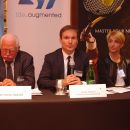 The expenditures on smart electricity meters will bring a quick return – is the conclusion of the discussion at the 4th Smart Communication & Technology Forum. During the Forum, it was announced that soon a common specification for Smart Grid devices will be ready. As the Energa Operator Director of the Department of Innovation, Dr. Adam Olszewski, proclaimed, program installation of smart meters – one of the elements of the smart grid Smart Grid – brought interesting and positive results. He mentioned the 2014 consumer test in Kalisz, in which 1244 households tested the functionality of the new devices. The study discovered that the introduction of multi-zone tariffs alone, i.e., different electricity prices at different times of the day, reduces energy consumption by 5-14 percent. On average, the consumption in the tested households fell by 2-4 percent, said Olszewski. Moreover, according to Olszewski, Energa Operator found an added functionality of its meters – meter data contributed to accurate calculation of more than just the estimate of the network operation: It turned out that it reduced by about one-tenth the technical losses of energy, which normally amounts to 4-5 per cent. That information was gleaned solely by the analysis of the information gathered from the meters. In addition, Olszewski noted that smart grid can automatically detect and isolate damage and automatically restore power, which yields a higher and faster return on costs.
The expenditures on smart electricity meters will bring a quick return – is the conclusion of the discussion at the 4th Smart Communication & Technology Forum. During the Forum, it was announced that soon a common specification for Smart Grid devices will be ready. As the Energa Operator Director of the Department of Innovation, Dr. Adam Olszewski, proclaimed, program installation of smart meters – one of the elements of the smart grid Smart Grid – brought interesting and positive results. He mentioned the 2014 consumer test in Kalisz, in which 1244 households tested the functionality of the new devices. The study discovered that the introduction of multi-zone tariffs alone, i.e., different electricity prices at different times of the day, reduces energy consumption by 5-14 percent. On average, the consumption in the tested households fell by 2-4 percent, said Olszewski. Moreover, according to Olszewski, Energa Operator found an added functionality of its meters – meter data contributed to accurate calculation of more than just the estimate of the network operation: It turned out that it reduced by about one-tenth the technical losses of energy, which normally amounts to 4-5 per cent. That information was gleaned solely by the analysis of the information gathered from the meters. In addition, Olszewski noted that smart grid can automatically detect and isolate damage and automatically restore power, which yields a higher and faster return on costs.It is difficult to accurately assess how much the smart grid improves efficiency of the entire energy system, but the savings can be estimated at several billion euros per year in the EU, said Gianluca Fulli, from the Joint Energy Research Center at the European Commission. He insisted that the Center is currently looking into the issue of rising prices (both wholesale and retail markets) due to an increase of RES in the energy system. He announced that a new report on the subject is forthcoming.
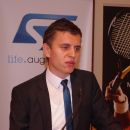 A great continuation of Dr. Olszewski's speech was a presentation by Maxim Granatiri, Head of the Moldovan ADD Innovative Technologies – a company that is a supplier of meters for the Polish Energa Operator. The Granatiri summed up the various stages of smart meter implementation and provided an analysis of Polish consumers. It is worth noting that the contract with Granatiri's ADD is by far the largest of its kind in Poland (310 thousand smart meters to measure power consumption with infrastructure data read). Energa Operator, in accordance with the current strategy for 2020, has spent 1.4 billion PLN on smart grid development. The company delivers electricity to 2.5 million households and more than 300 thousand companies, and has approximately 17 percent market share of electricity sales. The company operates a quarter of electricity distribution system in Poland (in terms of area).
A great continuation of Dr. Olszewski's speech was a presentation by Maxim Granatiri, Head of the Moldovan ADD Innovative Technologies – a company that is a supplier of meters for the Polish Energa Operator. The Granatiri summed up the various stages of smart meter implementation and provided an analysis of Polish consumers. It is worth noting that the contract with Granatiri's ADD is by far the largest of its kind in Poland (310 thousand smart meters to measure power consumption with infrastructure data read). Energa Operator, in accordance with the current strategy for 2020, has spent 1.4 billion PLN on smart grid development. The company delivers electricity to 2.5 million households and more than 300 thousand companies, and has approximately 17 percent market share of electricity sales. The company operates a quarter of electricity distribution system in Poland (in terms of area).Operators and Data Protection Inspector agree - protection of personal data must be found in the new Energy Act
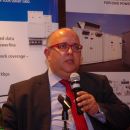 GIODO representative, Dr. Wojciech Wiewiórowski, announced that on Thursday (September 19) he will send comments regarding privacy policies. He said that GIODO needs to agree to certain data processing capabilities from the meters, because network operators need those data in order to effectively use full accessibility of the meters. Dr. Wiewiórowski stressed, however, that the user must have access to two key pieces of information: who has access to the data from the meter, and how the data is used. He added that GIODO will push legislation to allow data to be collected at 15-minute intervals, with the option of voluntary consumer agreement to a higher frequency of reading.
GIODO representative, Dr. Wojciech Wiewiórowski, announced that on Thursday (September 19) he will send comments regarding privacy policies. He said that GIODO needs to agree to certain data processing capabilities from the meters, because network operators need those data in order to effectively use full accessibility of the meters. Dr. Wiewiórowski stressed, however, that the user must have access to two key pieces of information: who has access to the data from the meter, and how the data is used. He added that GIODO will push legislation to allow data to be collected at 15-minute intervals, with the option of voluntary consumer agreement to a higher frequency of reading.Agnieszka Nosal of RWE Stoen said: The greater the precision of smart metering regulations, the more stable its implementation and design of information systems will be. Consumers need to have the comfort and assurance that the data from the meters is sourced for the right purposes and are adequately protected. Therefore, RWE Stoen Operator supports the position of the GIODO representative Wiewiórkowski, by which the protection of personal data and management should be included in the energy law Act to minimize the scope for creative interpretation.
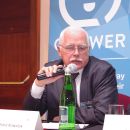 Meanwhile, a long-time employee of the Energy Regulatory Office (currently Advisor to the President's Office - Coordination Center for the Development of Intelligent Network, ERO), Dr. Tomasz Kowalak, announced that in November this year, the final version of the requirements to be met by all Smart Grid devices should appear. Currently, a team composed of representatives of the transmission system operator, distributors, retailers and manufacturers of energy equipment, are working on the issue. There is still a debate over two different options available: "pull" (the German model in which the smart meter is installed on the request consumer) and "push" (in which the presence of smart meter infrastructure encourages consumer to actively save energy, or lower its usage during peak), said Dr. Kowalak.
Meanwhile, a long-time employee of the Energy Regulatory Office (currently Advisor to the President's Office - Coordination Center for the Development of Intelligent Network, ERO), Dr. Tomasz Kowalak, announced that in November this year, the final version of the requirements to be met by all Smart Grid devices should appear. Currently, a team composed of representatives of the transmission system operator, distributors, retailers and manufacturers of energy equipment, are working on the issue. There is still a debate over two different options available: "pull" (the German model in which the smart meter is installed on the request consumer) and "push" (in which the presence of smart meter infrastructure encourages consumer to actively save energy, or lower its usage during peak), said Dr. Kowalak.The discussion of Smart Grid also introduced the topic of the unstable nature of renewable energy sources (RES). Dr. Adam Olszewski reminded participants that Energa Operator has in its area of operation a substantial number of wind farms, and a quarter to a third of its produced energy comes from renewable energy sources. He stressed that the network must be increase flexibility to process a more renewable energy sources, and Smart Grid solutions are a natural response.
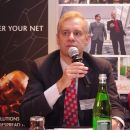 A similar problem was pointed out by ENEA Operator president Michał Jarczyński. He commented on the manner in which ENEA prepares for cooperation with the producers of energy from renewable sources and how much wind power ENEA is able to connect to the network. Mr. Jarczyński reported that in different locations of the network ENEA could now connect more than 1.7 thousand MW RES. However, due to the construction of Polish energy system for the big central plants, the integration of renewable energy sources into the grid can be challenging. ENEA has ambitious plans to implement mass rollouts of Smart Meters, but for now, there was a pilot implementation of approximately 1,500 meters in Opalenica, Szczecin and Wałcz. In the years 2014-2019, ENEA will spend more than 330 million PLN to install AMI.
A similar problem was pointed out by ENEA Operator president Michał Jarczyński. He commented on the manner in which ENEA prepares for cooperation with the producers of energy from renewable sources and how much wind power ENEA is able to connect to the network. Mr. Jarczyński reported that in different locations of the network ENEA could now connect more than 1.7 thousand MW RES. However, due to the construction of Polish energy system for the big central plants, the integration of renewable energy sources into the grid can be challenging. ENEA has ambitious plans to implement mass rollouts of Smart Meters, but for now, there was a pilot implementation of approximately 1,500 meters in Opalenica, Szczecin and Wałcz. In the years 2014-2019, ENEA will spend more than 330 million PLN to install AMI.Agnieszka Nosal, RWE Stoen Operator: Development of renewable energy sources cannot "cannibalize" other areas of operation of the energy companies
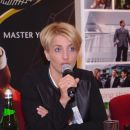 Agnieszka Nosal, Member of the Management Board of RWE Stoen Operator, in her speech during the Forum commented on the use of German experience in introducing RES to the electricity system. She also addressed the possibility of transfer of German regulations to Polish soil. During the debate, Nosal stressed that RWE Stoen Operator is carrying out an informational campaign. The campaign aims to raise awareness of the consequences of having a certain system solutions for consumers and the economy as a whole. The Vice-President said: Poland should keep an eye on the energy transformation that is now being introduced by the German regulator, i.e., Energiewende. The consequence is, for example, resignation of Germany's nuclear energy as a result of the disaster at Fukushima, and a strong trend to develop requirements and standards for the RES sector. In sum, development of RES cannot "cannibalize" other areas of the energy companies.
Agnieszka Nosal, Member of the Management Board of RWE Stoen Operator, in her speech during the Forum commented on the use of German experience in introducing RES to the electricity system. She also addressed the possibility of transfer of German regulations to Polish soil. During the debate, Nosal stressed that RWE Stoen Operator is carrying out an informational campaign. The campaign aims to raise awareness of the consequences of having a certain system solutions for consumers and the economy as a whole. The Vice-President said: Poland should keep an eye on the energy transformation that is now being introduced by the German regulator, i.e., Energiewende. The consequence is, for example, resignation of Germany's nuclear energy as a result of the disaster at Fukushima, and a strong trend to develop requirements and standards for the RES sector. In sum, development of RES cannot "cannibalize" other areas of the energy companies.It is worth noting that RWE Stoen Operator has plans for the years 2014-2015 to implement AMI system in parts of Warsaw. The scale of the implementation will be from 50,000 to 100,000 meters in the first stage. For the most part, the implementation will include multi-residential buildings and office space, in which the meters will be located on the outside. A few hundred smart meter units pilot was installed already in the buildings in the Marketplace in the center of Warsaw.
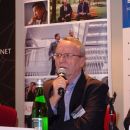 Another active participant of the debate was the Director of the Institute of Communications, Ing. Wojciech Hałka, who from 2003-2005 was Undersecretary of State in the Ministry of Infrastructure, and was responsible for the communications sector and development of the network infrastructure. In his speech, he commented on EU guidelines, indicating the need to implement an integrated investment in critical infrastructure. He stressed that preparations have been made in Poland for those guidelines to be satisfied in relation to the design and construction of an integrated electricity and telecommunication infrastructure. This is very important because the European Commission believes it will be a prerequisite by the EU for financial support of those projects. For many years, the major problem for joint investments was bureaucracy, which typically delayed projects, but the big legislative effort in July 2011 has fixed those concerns. Another important improvement for investments into smart grid is the 2014 EU directive relating to the common line investments (e.g., telecoms, energy), which is expected to increase, among others, efficient use of EU funds allocated for this purpose. In addition, the presidents of UKE and ERO signed a cooperation agreement to make decisions regarding any new normative documents, aiming to simplify investment into grids.
Another active participant of the debate was the Director of the Institute of Communications, Ing. Wojciech Hałka, who from 2003-2005 was Undersecretary of State in the Ministry of Infrastructure, and was responsible for the communications sector and development of the network infrastructure. In his speech, he commented on EU guidelines, indicating the need to implement an integrated investment in critical infrastructure. He stressed that preparations have been made in Poland for those guidelines to be satisfied in relation to the design and construction of an integrated electricity and telecommunication infrastructure. This is very important because the European Commission believes it will be a prerequisite by the EU for financial support of those projects. For many years, the major problem for joint investments was bureaucracy, which typically delayed projects, but the big legislative effort in July 2011 has fixed those concerns. Another important improvement for investments into smart grid is the 2014 EU directive relating to the common line investments (e.g., telecoms, energy), which is expected to increase, among others, efficient use of EU funds allocated for this purpose. In addition, the presidents of UKE and ERO signed a cooperation agreement to make decisions regarding any new normative documents, aiming to simplify investment into grids.Jacek Koźbiał: To be effective, systems must be capable of independent, intelligent operation
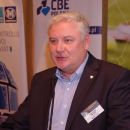 The director at Mikronika, Jacek Koźbiał, talked about broadband systems, Smart Communication for the Smart Grid. In his speech, he discussed examples of implementations of Smart Communication to the needs of Smart Metering and Smart Grid applications, and described the system operations. He stressed that to be effective, systems must be capable of independent, intelligent reconfiguration. As an example, he cited Mikronika's implementation in the municipality of Kleszczowa (system of telecommunication connections in low and medium voltage grid).
The director at Mikronika, Jacek Koźbiał, talked about broadband systems, Smart Communication for the Smart Grid. In his speech, he discussed examples of implementations of Smart Communication to the needs of Smart Metering and Smart Grid applications, and described the system operations. He stressed that to be effective, systems must be capable of independent, intelligent reconfiguration. As an example, he cited Mikronika's implementation in the municipality of Kleszczowa (system of telecommunication connections in low and medium voltage grid).After the plenary sessions the Forum hall was divided into two separate areas:
"Smart grid" – devoted to the issues of effective management of the network, automation solutions, innovative technology, and RES connection in the smart grid.
"Smart metering" – focused on smart metering for utilities, demand side response, and the relationship with the consumer.
Implementation in the Czech Republic – a pilot project DEMO5 Smart Region Vrchlabi
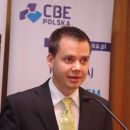 The first project discussed in the "smart grid" room was a pilot project, DEMO5 Smart Region Vrchlabi (part Grid4EU), implemented by the Czech DSO-CEZ Distribuce. The company was represented by Stanislav Hes, a specialist for new technologies. During his speech, he talked about the issues of automating the medium and low voltage distribution grid, insular operation and the communication structure of the project. The project DEMO5 Smart Region Vrchlabi aims to improve the infrastructure for grid connection of distributed generation and activation of final energy consumers. It also focuses on the micro-grid (insular smart grid) and the installation of smart meters.
The first project discussed in the "smart grid" room was a pilot project, DEMO5 Smart Region Vrchlabi (part Grid4EU), implemented by the Czech DSO-CEZ Distribuce. The company was represented by Stanislav Hes, a specialist for new technologies. During his speech, he talked about the issues of automating the medium and low voltage distribution grid, insular operation and the communication structure of the project. The project DEMO5 Smart Region Vrchlabi aims to improve the infrastructure for grid connection of distributed generation and activation of final energy consumers. It also focuses on the micro-grid (insular smart grid) and the installation of smart meters.As another speaker was Jacobo Penida, President of the Spanish company TELECON. The company specializes in the design, manufacture, deployment, and monitoring of smart grids.
Implementation in Germany: MeRegio - "Minimum Emission Regions"
 The next presented case study was project: MeRegio - "Minimum Emission Regions", presented by Hellmuth Frey, Head of Strategic Projects in EnBW Energie Baden-Württemberg AG. The presentation focused, among other things, on discussing technologies for energy storage. MeRegio is one of six projects in a large government program E-Energy in Germany. It is coordinated by EnBW, the third-largest energy supplier in Germany. The project combines elements of generation management, distributed energy connections innovation, and energy storage. 950 households participated in the project. The project has a budget of approximately 25 million Euros.
The next presented case study was project: MeRegio - "Minimum Emission Regions", presented by Hellmuth Frey, Head of Strategic Projects in EnBW Energie Baden-Württemberg AG. The presentation focused, among other things, on discussing technologies for energy storage. MeRegio is one of six projects in a large government program E-Energy in Germany. It is coordinated by EnBW, the third-largest energy supplier in Germany. The project combines elements of generation management, distributed energy connections innovation, and energy storage. 950 households participated in the project. The project has a budget of approximately 25 million Euros.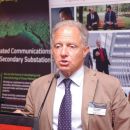 An interesting continuation of the presentation of the representative from EnBW Energie Baden-Württemberg AG was a presentation by Antonio Zingales, Sales Manager of the Italian company SAET SpA. He spoke in detail about the issues of energy storage as a new support for renewable energy in the smart grid. It was a very interesting lecture given the fact that only a few days earlier in northern Germany, the first commercial energy storage in Europe commenced operation, with a capacity of 5 MW. The importance of investments into energy storage underlines the fact that one of the Swiss cantons has announced plans to heavily invest in the technology. It plans to spend 2 million francs for work on the innovation of the industrial storage of energy produced by photovoltaics installations. So far, similar projects were merely pilots, and their aim was to test the commercial possibilities of storing energy from renewable sources. Now, large energy storage technology enters into a commercial stage – therefore Poland is of considerable interest to the subject.
An interesting continuation of the presentation of the representative from EnBW Energie Baden-Württemberg AG was a presentation by Antonio Zingales, Sales Manager of the Italian company SAET SpA. He spoke in detail about the issues of energy storage as a new support for renewable energy in the smart grid. It was a very interesting lecture given the fact that only a few days earlier in northern Germany, the first commercial energy storage in Europe commenced operation, with a capacity of 5 MW. The importance of investments into energy storage underlines the fact that one of the Swiss cantons has announced plans to heavily invest in the technology. It plans to spend 2 million francs for work on the innovation of the industrial storage of energy produced by photovoltaics installations. So far, similar projects were merely pilots, and their aim was to test the commercial possibilities of storing energy from renewable sources. Now, large energy storage technology enters into a commercial stage – therefore Poland is of considerable interest to the subject.Austrian Implementation - Project Smart Grids Model Region Salzburg, Salzburg Netz GmbH (Austria)
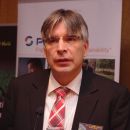 Walter Schaffer, MBE from Salzburg Netz GmbH, presented another case study, this time from Austria. He focused on aspects of energy management in "smart" networks, voltage control, power systems, and solutions combining smart grid and RES. The lecture referenced the applications previously presented, among others, by Jack Koźbiał of Mikronika. Project Smart Grids Model Region Salzburg (SGMS) is coordinated by Salzburg AG, which implements and harmonizes many aspects of the smart grid. Salzburg AG is a distributor of energy from central and northern Austria. The SGSM project aims to integrate different entities to the network, including distributed energy sources, the energy consumer (Smart Metering), buildings (Micro-Grid), and charging stations for vehicles (E-mobility), further enriching the network with data transmission systems (ICT) and data security.
Walter Schaffer, MBE from Salzburg Netz GmbH, presented another case study, this time from Austria. He focused on aspects of energy management in "smart" networks, voltage control, power systems, and solutions combining smart grid and RES. The lecture referenced the applications previously presented, among others, by Jack Koźbiał of Mikronika. Project Smart Grids Model Region Salzburg (SGMS) is coordinated by Salzburg AG, which implements and harmonizes many aspects of the smart grid. Salzburg AG is a distributor of energy from central and northern Austria. The SGSM project aims to integrate different entities to the network, including distributed energy sources, the energy consumer (Smart Metering), buildings (Micro-Grid), and charging stations for vehicles (E-mobility), further enriching the network with data transmission systems (ICT) and data security.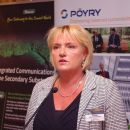 The next presentation was hosted by Åsa Roden, representing a Swedish company – Smart Grid Networks. The company provides innovative solutions for network automation and digital communication. It also helps customers to build automated and secure distribution system, which leads to increased efficiency of monitoring and control.
The next presentation was hosted by Åsa Roden, representing a Swedish company – Smart Grid Networks. The company provides innovative solutions for network automation and digital communication. It also helps customers to build automated and secure distribution system, which leads to increased efficiency of monitoring and control.French Large-scale Project GreenLys
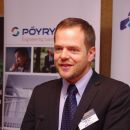 Guillaume Lehec, Head of connections, Eco metering - GDF Suez, introduced audience of the Forum to GreenLys, a project that combines all the elements of smart grid – from the energy producer to the consumer, including distributor and service providers. The project synthesizes the energy consumer, diverse sources of energy (solar and co-generation), electric vehicles and smart meters. It takes place in two French cities, Lyon and Grenoble. The participants include about 1,000 retail customers and 40 commercial energy consumers. Between the years 2012-2016, there will be 40 million Euros invested in the project implementation. Thanks to the study, the consortium better understand the potential that installing smart meters and grids give. Apart from GDF Suez, other companies involved in GreenLys are as follows: ERDF, GEG, Schneider Electric, Grenoble INP, Atos Worldgrid, CNRS EDDEN, Hespul, CEA-LITEN, Alstom Grid, WEEE, and RTE.
Guillaume Lehec, Head of connections, Eco metering - GDF Suez, introduced audience of the Forum to GreenLys, a project that combines all the elements of smart grid – from the energy producer to the consumer, including distributor and service providers. The project synthesizes the energy consumer, diverse sources of energy (solar and co-generation), electric vehicles and smart meters. It takes place in two French cities, Lyon and Grenoble. The participants include about 1,000 retail customers and 40 commercial energy consumers. Between the years 2012-2016, there will be 40 million Euros invested in the project implementation. Thanks to the study, the consortium better understand the potential that installing smart meters and grids give. Apart from GDF Suez, other companies involved in GreenLys are as follows: ERDF, GEG, Schneider Electric, Grenoble INP, Atos Worldgrid, CNRS EDDEN, Hespul, CEA-LITEN, Alstom Grid, WEEE, and RTE.Spanish Experience - Project STAR
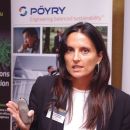 Ms. Marta Solaz, Regional Project Manager at Iberdrola Engineering, spoke about the large-scale project, STAR. In her speech she talked about communication issues in the electricity network PLC, BPL. STAR aims at modernizing the network operated by Iberdrola, including the replacement of all analogue meters to smart meters, which amounts to 10 million units by the end of 2018. Part of the project is the implementation of STAR in Castellon, which became the first Spanish city with a fully "smart" network. In Castellon, Iberdrola exchanged 100,000 analogue meters to smart meters in PRIME standard. Transformer stations were arranged so that they remotely complete tasks such as meter readings, coordinating registration, and customer subscription changes. The whole city of Castellon is now a unique power distribution system with extensive communication system and automatic network.
Ms. Marta Solaz, Regional Project Manager at Iberdrola Engineering, spoke about the large-scale project, STAR. In her speech she talked about communication issues in the electricity network PLC, BPL. STAR aims at modernizing the network operated by Iberdrola, including the replacement of all analogue meters to smart meters, which amounts to 10 million units by the end of 2018. Part of the project is the implementation of STAR in Castellon, which became the first Spanish city with a fully "smart" network. In Castellon, Iberdrola exchanged 100,000 analogue meters to smart meters in PRIME standard. Transformer stations were arranged so that they remotely complete tasks such as meter readings, coordinating registration, and customer subscription changes. The whole city of Castellon is now a unique power distribution system with extensive communication system and automatic network.Implementation in USA - Smart Sacramento, "Sacramento Municipal Utility District"
 Undoubtedly, a novelty during the Forum was the presentation by Jennifer Potter, Principal Market Analyst, Pricing and Resource Planning - Sacramento Municipal Utility District, who talked about the project "Smart Sacramento" that took place in the United States. The project was awarded the best Smart Grid project of 2013 by the magazine PowerGrid International. This was the first presentation on this topic in Poland and thus in Europe. The project "Smart Sacramento" is a huge investment (equivalent to a quarter of a billion Euros) launched in 2009 by the Sacramento Municipal Utility District (SMUD) to modernize the network and meters in metropolitan Sacramento, California. It focuses on 100 percent smart meter deployment, automated network and offers dynamic tariffs, which force the use of off-peak energy demand. The project was a raving success. There were 619,000 smart meters installed. Each month SMUD saves a sizable amount through lower network costs and peak network load reduction. Experience from the USA was especially interesting for the representatives of the DSO/TSO from Lithuania and the Czech Republic, where there are plans for a new pilot implementation in the field of smart metering.
Undoubtedly, a novelty during the Forum was the presentation by Jennifer Potter, Principal Market Analyst, Pricing and Resource Planning - Sacramento Municipal Utility District, who talked about the project "Smart Sacramento" that took place in the United States. The project was awarded the best Smart Grid project of 2013 by the magazine PowerGrid International. This was the first presentation on this topic in Poland and thus in Europe. The project "Smart Sacramento" is a huge investment (equivalent to a quarter of a billion Euros) launched in 2009 by the Sacramento Municipal Utility District (SMUD) to modernize the network and meters in metropolitan Sacramento, California. It focuses on 100 percent smart meter deployment, automated network and offers dynamic tariffs, which force the use of off-peak energy demand. The project was a raving success. There were 619,000 smart meters installed. Each month SMUD saves a sizable amount through lower network costs and peak network load reduction. Experience from the USA was especially interesting for the representatives of the DSO/TSO from Lithuania and the Czech Republic, where there are plans for a new pilot implementation in the field of smart metering.Dutch representative - the mass implementation of meters - DSMR 4.0
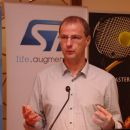 The Dutch market was represented by Leo Kramp, Test Manager, in the department of Smart Meters in Stedin Meetbedrijf. The Dutch company is the operator of the distribution network, which is in the process of implementing a major project, DSMR 4.0. The project began in 2012 and will last until the end of 2015, during which Stedin is installing half a million meters. DSMR 4.0 is the largest implementation of its kind in the Netherlands. An interesting issue in that project is a custom design of the meter from which the fuse was removed. Other interesting topics of the presentation were creating inter operative standards, issues of communication and meter automation.
The Dutch market was represented by Leo Kramp, Test Manager, in the department of Smart Meters in Stedin Meetbedrijf. The Dutch company is the operator of the distribution network, which is in the process of implementing a major project, DSMR 4.0. The project began in 2012 and will last until the end of 2015, during which Stedin is installing half a million meters. DSMR 4.0 is the largest implementation of its kind in the Netherlands. An interesting issue in that project is a custom design of the meter from which the fuse was removed. Other interesting topics of the presentation were creating inter operative standards, issues of communication and meter automation.Danish experience - NRGi project
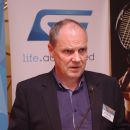 NRGi was represented on the Forum by Poul Barthelsen, who is also a member of OSGP Alliance (formerly Energy Services Network Association - ESNA). In 2012, NRGi deployed 380,000 smart meters. As there were many operators of the distribution network, NRGi wanted to implement smart meters in order to improve its system of fee collection. The installment of such a large number of devices, however, was a challenge. During the most dynamic time, NRGi managed to install up to 2,000 meters a day. Between 99.7 percent and 99.9 percent of the meters worked flawlessly on the day of installment. NRGi managed to reach 99 percent of users, and customer satisfaction was constantly monitored, achieving excellent results. The entire implementation took two and a half years. NRGi now operates its network as a data network.
NRGi was represented on the Forum by Poul Barthelsen, who is also a member of OSGP Alliance (formerly Energy Services Network Association - ESNA). In 2012, NRGi deployed 380,000 smart meters. As there were many operators of the distribution network, NRGi wanted to implement smart meters in order to improve its system of fee collection. The installment of such a large number of devices, however, was a challenge. During the most dynamic time, NRGi managed to install up to 2,000 meters a day. Between 99.7 percent and 99.9 percent of the meters worked flawlessly on the day of installment. NRGi managed to reach 99 percent of users, and customer satisfaction was constantly monitored, achieving excellent results. The entire implementation took two and a half years. NRGi now operates its network as a data network.I wanted to once again thank all of you for taking your time to participate in our project. It was a pleasure to welcome you, to be able to listen to your interesting speeches and participate in the discussions. From the feedback received from our guests we know that it was time well invested, used to improve knowledge, exchange experience and meet interesting people. We hope that this event will translate into tangible business benefits and encourage further cooperation with our company at the next, 5th edition of Forum, scheduled for June 2015 in Warsaw.
Maria Przekopowska
Managing Director
CBE Poland
The above article has been prepared based on the lectures and materials from the 4th edition of the "Smart Communications & Technology Forum", which took place on 18 September 2014. The event was organized by CBE Poland. The above text uses the article prepared by PAP that covered the Forum and materials released by companies: Energa operator, RWN Stoen Operator, and Enea Operator.
Strategic partners Forum were Mikronika, Smart Grid Networks, ADD Grup, Telecon Galicia, Opower, SAET. As an exhibitor at the event, presented the company: ST Mikroelectronics, Devolo, Poyry Management Consulting, PRIME Alliance. Honorary Patronage of the forum were: European Commission - The Joint Research Centre, SEDC - Smart Energy Demand Coalition, ČTPSG - Česká Technologická Smart Grid platform, Platform IUSER, The Israeli Smart Energy Association ISEA, OSGP Alliance - The Open Smart Grid Protocol, The Siberian Branch of The Russian Academy of Sciences, Irkutsk Scientific Center of The Consortium Smart Power Grids - Poland, Institute of Tele-and Radio, PTI, BESTGRID, the National Committee. Control and Energy Prices (NCC), Industrial Technology Research Institute (ITRI) Taiwan, in addition, substantial work has involved: EURELECTRIC (Union of the Electricity Industry), Chief Technical Organization (NOT), the Association of Polish Electrical Engineers, the Office of Electronic Communications, PRIME Alliance (PowerLine Intelligent Metering Evolution), the Renewables-Grid-Initiative, WADE (World Alliance for Decentralized Energy). In addition, the event was created in cooperation with the General Inspectorate for Environmental Protection, Eurelectric, Enea, RWE Stoen Operator, Smuda, Slazburg Netz GMBH, ENBW, Distribuce CEZ, GDF Suez, Stedin, NRGi, Iberdrola. We provide company Bireta. Media partner was the Polish Press Agency.





























































































































































































































